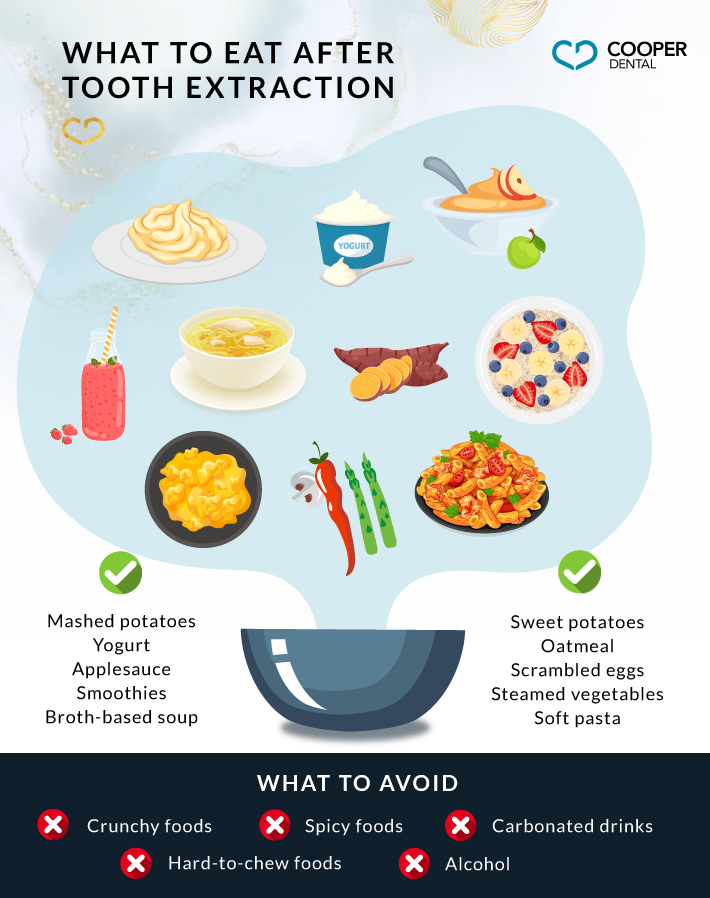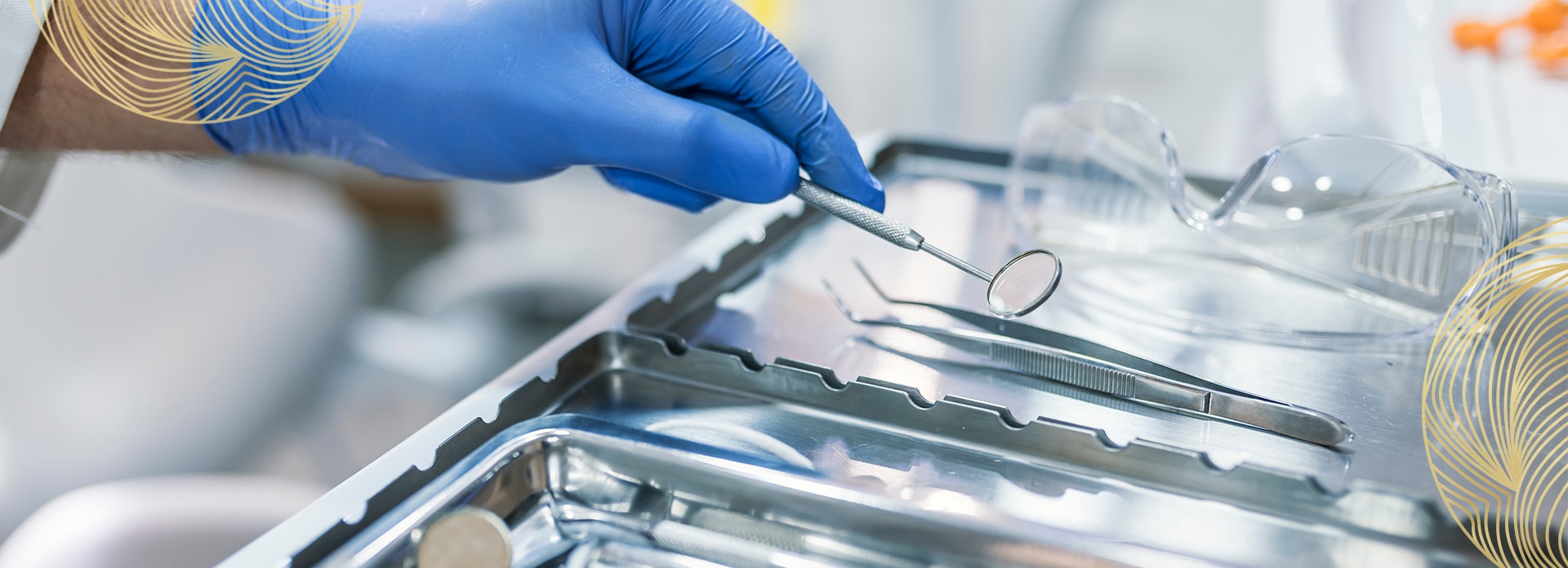When you undergo a tooth extraction, ensuring a smooth recovery involves more than just proper wound care. Your diet plays a pivotal role in how quickly and comfortably you heal post-surgery.
The foods you eat during the recovery period can not only foster recovery but also make your transition to a regular diet more manageable. Whether you’re tending to an extraction site or caring for a loved one post-surgery, the following foods can be safe to eat while healing:
- Mashed potatoes
- Yogurt
- Applesauce
- Smoothies
- Broth-based soup
- Sweet potatoes
- Oatmeal
- Scrambled eggs
- Steamed vegetables
- Soft pasta
The Significance of Post-Extraction Diet
The post-surgical diet you adopt is more than a list of “do’s and don’ts”—it is a crucial step in your body’s larger healing process.
After a tooth is removed, a blood clot forms in the tooth socket to protect the bone and nerves underneath. This clot is vital to the healing process and must be safeguarded. The right diet can help minimize discomfort, prevent infections, and promote faster healing.
For the first few days, your focus should be on consuming foods that require little to no chewing and will not disrupt the blood clot.
How Long Is the Healing Process for Tooth Extraction?
The duration of recovery varies based on the complexity of the extraction, the individual’s health, and adherence to dental recommendations, but generally, significant healing occurs in the first few weeks.
For simple extractions, patients can typically resume a normal diet after a few days, while more complex surgeries may require a soft food diet for a week or more. The immediate post-op restrictions are there to protect the extraction site, so be sure to follow your dentist’s guidance on when to transition to a more regular diet.
Immediate Post-Extraction Foods
For the first 24 hours after the procedure, stick to water and liquids like applesauce or soup, slowly transitioning to softer, plain foods for the next couple of days. Avoid hot foods and drinks, drinking through a straw, and any biting or chewing near the extraction site.
1. Mashed Potatoes
You may want to start simple with something like mashed potatoes—they’re comforting and require minimal effort to consume. Avoid adding spices or serving them too hot, as these can irritate the extraction site.
2. Yogurt
Yogurt is an excellent source of probiotics and protein—both of which are essential for the healing process. Opt for plain, unsweetened varieties. Probiotics can help prevent infection by maintaining healthy gut flora, and the cool temperature is pleasing post-surgery.
3. Applesauce
Unsweetened applesauce is a soothing choice that also provides nutrients and fibre. Picking up a few single-serve cups can be a good choice for a quick and easy snack that is readily available.
4. Smoothies
Smoothies are an excellent way to get a nutrient-rich meal without the need for chewing. You can customize them to your taste preferences while packing them with vitamins, minerals, and protein. Use ingredients like bananas, berries, and leafy greens, but avoid using a straw to sip them, as the suction can dislodge the blood clot in the extraction site.
5. Broth-Based Soups
Gentle on the extraction site, broth-based soups are warming and comforting, offering hydration and nourishment. Ensure the soup is not too hot and contains soft, easy-to-swallow ingredients. Soups can also be a good source of vegetables and protein if you include soft-cooked ingredients like carrots or chicken.
Preparing Foods for Consumption
It is key to prepare foods to a consistency where little to no chewing is required. Use a blender or food processor if needed to create a soft, pureed texture. Additionally, ensure that all foods are lukewarm or cool, never hot or cold, as temperature extremes can exacerbate pain and discomfort.

Transitioning to Solid Foods After Tooth Extraction
Gradually, you will be able to integrate more varied and solid foods into your diet. Here are some recommendations for the second stage of your recovery period.
6. Sweet Potatoes
Rich in vitamins and nutrients, sweet potatoes help support the immune system, which can aid in your recovery. They can be boiled, mashed, or baked until they are soft and easy to consume without requiring significant chewing. Avoid any large or crunchy toppings that could disrupt the healing site.
7. Oatmeal
A warm bowl of oatmeal (not too hot!) is an easy and fulfilling breakfast or snack. Add a dollop of honey or pureed fruit for sweetness without irritating your extraction site.
8. Scrambled Eggs
Eggs are a rich source of protein, and scrambled eggs are gentle on post-extraction soreness. Cooked until they are just set, when they are easy to eat without being overly chewy.
9. Steamed Vegetables
Soft steamed vegetables such as carrots, zucchini, and squash make an excellent addition to your recovery diet. They are easy to digest and packed with vitamins and minerals essential for healing. Ensure they are steamed to a soft texture to avoid any unnecessary chewing that might disturb the healing site.
10. Pasta
Cooked until soft, pasta can be a comforting and easy-to-eat option. Opt for plain pasta or with a smooth sauce that does not contain large chunks of meat or vegetables. Avoid spicy or acidic sauces that might irritate the extraction site. Pasta provides a good source of energy and can be a satisfying meal without taxing your mouth during the recovery phase.
Common Mistakes to Avoid After a Tooth Extraction
It is as much about what you do not eat as what you do. Some foods can be abrasive and irritating to the extraction site. Here are some foods and drinks you should avoid in your post-extraction diet:
- Crunchy foods
- Spicy foods
- Carbonated drinks
- Hard-to-chew foods
- Alcohol
Contact Cooper Dental for Post-Extraction Tips
Your post-tooth extraction diet is an essential part of your recovery process. By being conscious of the foods you are consuming you are not only supporting proper healing, but also promoting your overall oral health.
It’s important to maintain open communication with your dental professional about any concerns or difficulties you may have with your diet post-surgery. If you would like further information tailored to your specific case, or if you have any questions about post-surgery diets or dental-related care, the Cooper Dental team is here to support you on your healing journey. Get in touch with us for personalized advice and resources.




